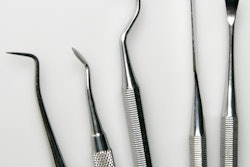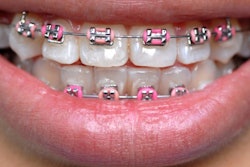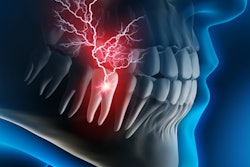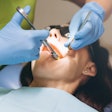
Temporomandibular disorders (TMDs) can have an impact on oral health-related quality of life (OHRQoL), according to a study published in the Journal of the American Dental Association. The association was worse for patients with chronic, painful TMDs.
Prior research has suggested that pain can affect both physical and psychosocial quality of life, the researchers noted. Their study, which looked at the severity of TMD in 830 patients, confirmed that link.
"A large number of studies have confirmed the existence of psychological problems in patients with chronic pain; meanwhile, psychological distress has been shown to affect pain chronification," wrote the authors, led by Dr. Ye Cao, PhD, an associate professor at the Center for TMD and Orofacial Pain at Peking University School and Hospital of Stomatology in Beijing (JADA, October 28, 2021).
The researchers invited 907 patients at the Peking University School and Hospital of Stomatology with TMDs to participate in the study. Some were excluded due to their patient history, including history of treatment in the past month and nonmedical drug abuse.
Patients were classified based on the duration of their TMD symptoms. Researchers used the Oral Health Impact Profile (OHIP) to assess their oral health-related quality of life, which included discomfort, physical disability, and social disability. They also accounted for patients' sex and age.
Patients with chronic TMDs lasting more than three months had higher OHIP scores, indicating worse quality of life, than those with acute TMDs occurring three months or shorter.
For the physical pain, psychological disability, social disability, and handicap domains, the authors found a connection between TMD chronicity and subtypes. Whereas for the functional limitation, psychological discomfort and physical disability domains, they found no significant correlation.
"Both TMD chronicity and subtypes influenced OHRQoL," the authors wrote. "Painful TMDs were associated with significantly poorer OHRQoL than nonpainful TMDs."
Interestingly, TMD chronicity appeared to affect OHRQoL only for the painful TMD conditions, the authors noted. However, they cautioned low sensitivity may lead to a failure to diagnose patients and can magnify the number of chronic patients. Other oral conditions may also be a factor in the relationship between TMD duration and OHRQoL.
Future studies are needed to address these shortcomings, according to the authors. These studies should be longitudinal and take oral conditions, psychological factors, sleep, and a patient's pain into consideration.
"Early biopsychosocial intervention in acute TMD pain is prudent to minimize pain chronification and decline in OHRQoL," the authors wrote. "Future work on the impact of TMDs on OHRQoL thus should strive to stratify patients by both TMD subtypes and duration."



















